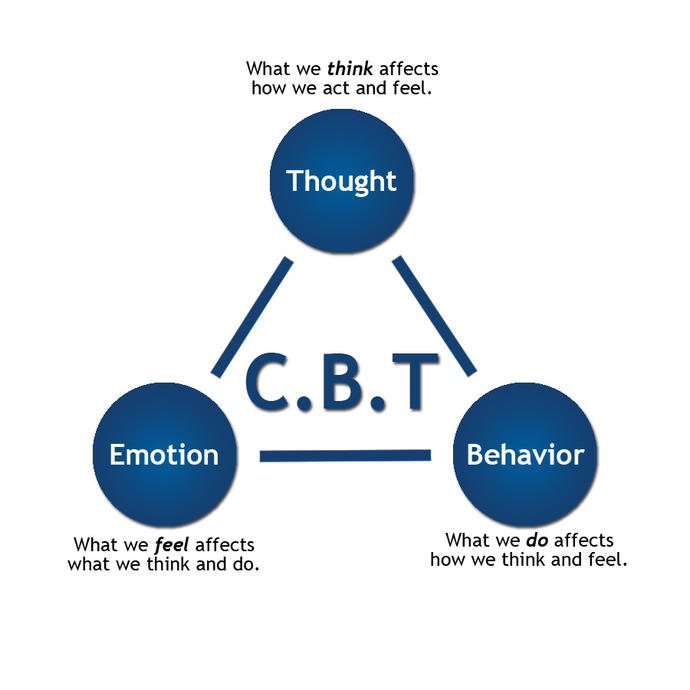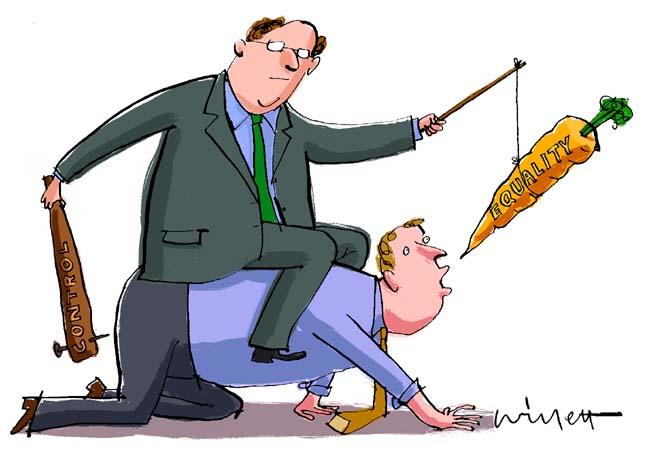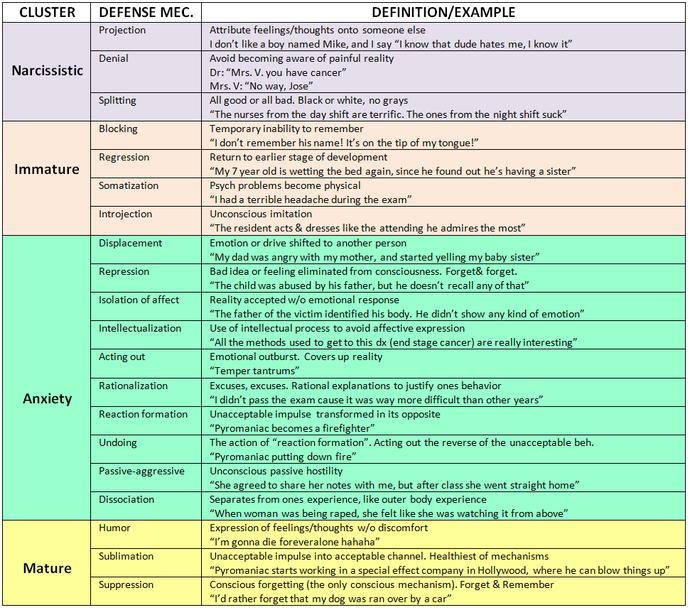
I was never a big believer in psychology. I always considered it a "bullshit" science - something people selected as their major in college if they were bad at math or biology, or chemistry, or physics.
I never genuinely acknowledged "feelings" and "emotions." Starting early in life, "feelings" and "emotions" were always the reason or excuse my mother used to manipulate me into "doing things" (e.g., you know how much it "hurts my feelings" when you don't clean your room, or "I feel so proud of you" for cleaning your room). Around the 4th to 6th grade, I started to become aware of how girls used a similar technique - especially when interacting with boys.
So, the only logical thing for a child to do in these circumstances was to simply "avoid" acknowledging, and in turn understanding, how feelings and emotions work. After all, the more the young boy would acknowledge and "respect" the feelings and emotions of others, the more others could use those feelings and emotions as an "excuse" to manipulate the young boy. So, "avoidance" was the earliest defensive mechanism in this young boy's life.
What I realized in college was that I was not alone. Many, if not most, men were on a similar boat. They viewed the world through objective and dispassionate reason, which made subjects like math and the physical sciences easier, but left subjects like English literature or "art" as a bit of a mystery.
It was really not until law school, and more particularly, all of the "advocacy" classes (e.g., trial advocacy, appellate advocacy, negotiation, etc.), where my eyes started to open up to perhaps accepting psychology as a genuine science. After law school, while I was working at a small boutique "bet the company" litigation firm, I went through what can only be described as my "legal residency program."
For the next two years, I was forced to watch 8-hour long mock trials followed by shadow jury deliberations. All the young associates would sit with M.D., Ph.Ds in psychology, psychiatry, and neurology, and former state and Federal law enforcement officers going over interrogation techniques for questioning at depositions and trial. It was a learning experience that not only my ignorant younger self didn't appreciate, but actively loathed. Yet, it helped put the 15-21 year old period of my life into perspective.
The older you get, the more you sort of wish you "knew then what you know now." So, for any young guys out there who haven't yet reached that point in life where they "know everything" (and I hope you never do, even in your 70s), and who are open to the possibility of learning new information that may help them grow and improve the quality of their life going forward, this is my take on basic human psychology.

The human brain is the "hardware," whereas the "psyche" is the "software" through which data and other input is processed in order to produce an "output." For what I consider one of the more excellent and clearly to-the-point discussions of the "Id, Ego, and Superego," see https://www.hypnosisforyou.com/psyche.html (please take some time to first read this one page summary on the "Id, Ego, and Superego" before reading any further).

It's important to remeber that in addition to the "Id, Ego, and Superego" concepts (discussed in more detail in the link above), we are not 100% aware of 100% of our thinking process 100% of the time. Not only is there the problem of shifting in, out, and between different thinking "states," but there is also the problem of "limited capacity" and "consciousness."
Limited capacity describes our natural limitation with processing clusters of information at any given time. Think of it like the surface area on your work desk, or the cashe or RAM on your computer. There is only a limited window of time that a thought can be processed in "immediate" or "short-term" memory before other thoughts must be addressed. Yet, the human operating system does not "crash" when this happens; it simply "dumps" and "clears" that immediate and short-term memory to make way for new thoughts that need to be addressed.
Consciousness, as you probably already know, describes our "awareness" of our thoughts and thinking process. Think of it like what you see when on your monitor when you open up your desktop computer. What you see does not come anywhere close to representing 100% of all of the processes that are running on your computer at any given point in time, but it's "something."
The conflicts between the "Id" and "Superego" take place in the unconscious level. The "conclusions" or "resolutions" of those conflicts, as correct or incorrect as they may be, first present themselves in the "subconscious" level. There, the combination of external inputs from our environment (i.e., five senses) and the internal inputs from our unconscious process (i.e., resolution of a conflict between the "Id" and "Superego") are allowed to be subject to some indirect degree of conscious input from the part of our thinking process that we're aware of (i.e., the "Ego").

The combination of the conclusions of our unconscious thinking process and external input from our environment, processed through the "Ego," result in an indirect and rather amorphous "output" we often call "emotions" or "feelings."
A "feeling wheel" is a useful tool to try to classify and identify different categories of emotions. The top half of the wheel represents emotions that we consider "negative." The bottom half of the wheel represents emotions that we consider "positive." "Antithetical" emotions are directly opposite from each other.
For example, when something from the outside environment causes you to "no longer feel powerful," you may feel "mad." For example, consider your boss "threatening to fire you" (i.e., job security, ability to earn resouces to survive) unless you work more time for no additional pay. If something no longer makes you feel "important, appreciated, respected, satisfied, valuable, intelligent, or confident," you may begin to feel, "hurt, hostile, angry, hateful, critical, irritated, furious, or frustrated."
What happens next is really one of the most important phenomena of psychology.

The "starting point" of this "cycle" begins with "emotions." We "feel" a certain way, and as a result, our "conscious" thinking process tries to understand and make sense of these feelings. We then begin to try to "rationalize" the way we feel by creating a rule or belief through our conscious thinking process. Simultaneously, our conscious-level awareness of our "thinking" or "thoughts" may cause is to "do" or "behave" a certain way (sometimes, for no reason other than to simply validate or confirm or be consistent with the concious-level "thoughts" we are having at that moment). In turn, what we "do" and how we "behave" will create new inputs for both our environment and unconscious thinking process to digest, which will lead to a new "output" of emotions and feelings (often consistent with that previous behavior).

Tying it all together, our early childhood experiences (e.g., parents, socialization with other children, animal attacks, traumatic events) caused our "Superego" to form a set of "core beliefs." Because "how and what WE THINK is ALWAYS RIGHT and NEVER WRONG" (sarcasm emphasized), the "Superego" needs to "reinforce" these "core beliefs" by creating "assumptions" and "rules" (i.e., conditional logical statements), or "intermediate beliefs" that simply support the validity of the "core beliefs" we formed during our early childhood (hint: this is why therapists are so interested in one's early childhood).
Sometimes, our "core beliefs" are not always consistent with reality or the "objective truth" of our external environment. As a result, when we perceive input and information from our external environment through the lens of "core beliefs" that are inconsistent with reality, we commit "errors in logic." This will trigger the cycle between emotions, thoughts, and behavior (described earlier above).

Now, sometimes, an "error in logic" (again, caused because of some erroneous core belief deeply ingrained and reinforced deep without our superego) will cause us to experience a "negative" emotion. Sometimes, that negative emotion simply results in nothing more than us "feeling bad" or "down." Sometimes, however, the emotional reasoning cycle continues, which results in "behavior" (or lack thereof), which contributes to or outright causes more tangible or visible problems in our life (and in turn, leading to more "negative emotions").
Remember, at the core of our unconscious thinking process is the "Id" (the "inner child" of the psyche). The Id's most basic perogative is to seek out pleasure and comfort, and avoid pain and discomfort.

As a result, whenever an "emotion" or "thought" is "painful," or "negative," or "uncomfortable," our psyche may look for ways to "protect" itself from such psychosomatic pain and discomfort by using a variety of "defensive mechanisms." Examples of a few common defensive mechanisms are listed below.

Yet, while these defensive mechanisms may help in avoiding experiencing psychosomatic pain and discomfort temporarily, they do very little to address the "cause" or "root" of why we continue to experience these negative thoughts or emotions in the first place (i.e., "errors in logic" from deeply ingrained "core beliefs"). Not only can defensive mechanisms have potential negative effects on our own behavior and life, but they can also have a negative effect on the behavior and lives of those around us (which will, in turn, have a negative effect on us). Additionally, because "how and what WE THINK is ALWAYS RIGHT and NEVER WRONG" (sarcasm emphasized), the more we "avoid" addressing the real cause of our negative thoughts and emotions, the more our conscious thinking process will continue to develop rationalizations and justifications for our emotions, thoughts, and behavior (i.e., further reinforcing the "intermediate beliefs" that enable the erroneous "core beliefs" that cause our "errors in logic" to continue).

The ultimate goal is for us to be "happy," not just on the outside, and also not because we are "insane" or "delusional," (i.e., erroneous core beliefs that result in serious errors in logic that cause us to feel "positive" emotions where normal people would regularly experience "negative" emotions), but because we have realized that the "core beliefs" we formed as "CHILDREN" during early childhood may not be 100% true or consistent with the objective reality we exist in. A large part of emotional health, stability, and happiness has to do with our more mature "ADULT" self looking honestly and deeply within our thinking process to uncover erroneous "core beliefs," and then replace them with beliefs that are more in line with reality (and more condusive to us being genuinely happy and emotionally healthy).
If you read this far, I do realize this take was rather long, so I want to reward your dedication and efforts with a delicious chocolate cookie.

 Holidays
Holidays  Girl's Behavior
Girl's Behavior  Guy's Behavior
Guy's Behavior  Flirting
Flirting  Dating
Dating  Relationships
Relationships  Fashion & Beauty
Fashion & Beauty  Health & Fitness
Health & Fitness  Marriage & Weddings
Marriage & Weddings  Shopping & Gifts
Shopping & Gifts  Technology & Internet
Technology & Internet  Break Up & Divorce
Break Up & Divorce  Education & Career
Education & Career  Entertainment & Arts
Entertainment & Arts  Family & Friends
Family & Friends  Food & Beverage
Food & Beverage  Hobbies & Leisure
Hobbies & Leisure  Other
Other  Religion & Spirituality
Religion & Spirituality  Society & Politics
Society & Politics  Sports
Sports  Travel
Travel  Trending & News
Trending & News
Most Helpful Opinions